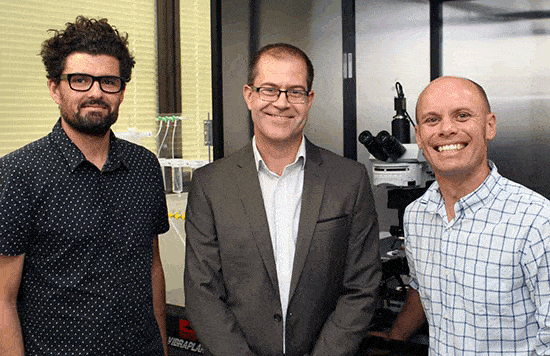
A laser-equipped microscope that gives brain researchers unparalleled insight into mental illness has just been installed at the University of Newcastle.
A laser-equipped microscope that gives brain researchers unparalleled insight into mental illness has just been installed at the University of Newcastle.
Co-funded by mining firm Glencore, HMRI and the University of Newcastle, the $200,000 instrument is the first in Australia. It will be used to explore complex disorders such as depression, stress, addiction, chronic pain and balance dysfunction.

The high-tech system uses what is known as Laser Applied Stimulation and Uncaging (LASU), where proteins are inserted directly into brain cells (neurons) then excited by applying laser light.
“It has been a major challenge over many decades for neuropsychiatric researchers to understand how cells integrate with networks in the brain.Traditional techniques only gave us a one-dimensional picture,” researcher Dr Chris Dayas said.
“This new process, called optigenetics, allows us to selectively turn cells on and off. We’ll get an accurate and detailed understanding of brain functions and the processes involved in mental illnesses.”
Glencore Community Relations Manager Craig Strudwick said that funding the LASU microscope was part of the company’s overall commitment to improving regional health and wellbeing.
“When you consider the prevalence of mental illness across Australian society it naturally touches our employees to some extent, as well as their families and also the communities in which they work and live,” Mr Strudwick said.
“New treatments are badly needed and, with some of the world’s top brain scientists working here in the Hunter, we’re looking forward to hearing about the many discoveries that this microscope will facilitate across a wide range of diseases.”
The University of Newcastle has built a specialised laboratory to prepare the optogenetic probes needed. The microscope has already been instrumental in the submission of four federal project grants exceeding $2 million.
“Before we can make significant advances in how psychiatric conditions are treated we need more knowledge of the brain ‘connectome’. LASU will help unlock the cell connections,” Dr Dayas adds.
“It gives our group a competitive advantage nationally and the benefits will flow back to the Hunter community. We are so appreciative of the support from Glencore.”
* Dr Chris Dayas is a member of the University of Newcastle’s Priority Research Centre for Translational Neuroscience and Mental Health Research, researching in conjunction with the HMRI’s Brain and Mental Health program. Glencore is Australia’s largest coal producer with 13 mining complexes across NSW and Queensland, employing more than 8,000 Australians.
HMRI would like to acknowledge the Traditional Custodians of the land on which we work and live, the Awabakal and Worimi peoples, and pay our respects to Elders past and present. We recognise and respect their cultural heritage and beliefs and their continued connection to their land.
Hunter Medical Research Institute
We’re taking healthy further.
Locked Bag 1000
New Lambton
NSW, Australia, 2305


This site is protected by reCAPTCHA and the Google Privacy Policy and Terms of Service apply.
Copyright © 2024 Hunter Medical Research Institute | ABN: 27 081 436 919
Site by Marlin Communications
